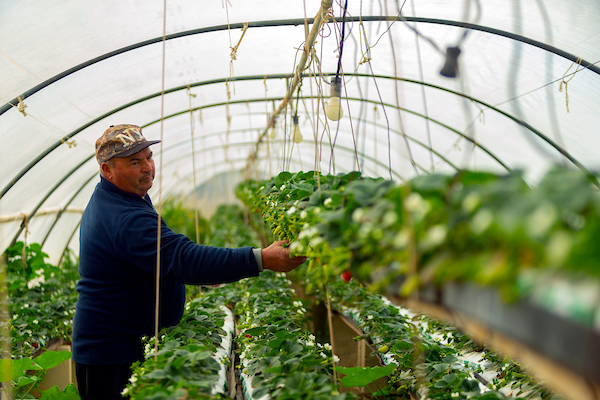Ta’ Bona Farm is a family-run project located in the bucolic Virtù Valley in Rabat. Ġanni works around sixty tumoli of land with his wife and children, and sometimes with the additional support of a farmhand.
It is no small feat to manage a farm of this scale but Ġanni is devoted to the land, which has been passed down for several generations until it became his to take care of. He has lived and worked as a farmer his entire life, stating that he was born and raised on the land. Ġanni and his family are fortunate enough to be living right next to their fields, which allows them to have a close relationship with their land and to work at their own pace, toiling away in open fields, two greenhouses, and their citrus and pear orchard.
Ġanni prides himself on working with nature and enthusiastically explains the crop rotation process—known in Maltese as in-newba—he adopts in his fields, making sure to allow the land enough time to remain fallow to rest. He has spent his life accumulating the knowledge of his ancestors on crop rotation, seed saving, and taking care of the soil. Nonetheless, he feels as though he has never learnt enough, especially given that in this sector, a farmer needs to keep learning constantly, sometimes not out of sheer interest but rather, due to changing conditions.
He laments that finding Maltese seeds is virtually impossible since seeds are imported nowadays. Working with imported seeds means that the varieties are not adapted to the environmental and climatic conditions of these islands. This leads to crops sometimes being more susceptible to pests and therefore requiring more care and attention. Because Ġanni has an aversion to using unnecessary pesticides and herbicides, he uses an ecosystem-based approach that focuses on the long-term prevention of pests. He does this through a combination of techniques such as biological and natural control, habitat manipulation, modification of cultural practices, and the use of resistant varieties. With this method, he reduces and sometimes completely eliminates the use of pesticides.
It is heartening to see that Ġanni is still keen on learning new methods to improve his production. Through the EU’s Common Agricultural Policy, he has received funds that were invested into greenhouses which give the farm the capacity to grow tomatoes, cucumbers, peppers, aubergines, and zucchini out of season.
Despite the challenges farmers are facing, especially considering the low income in the sector, Ġanni tries to do things differently, and every Tuesday and Saturday you can find the entire family selling products at the Farmer’s Market in Ta’ Qali. Here, consumers are willing to buy produce at a fair price that reflects the hard labour that goes into growing the food. Ta’ Bona Farm also has an online shop on their website where people can buy produce and get it delivered to their doorstep. These alternative ways of selling produce mostly keep Ġanni away from the Pitkalija market, which notoriously pushes farmers into selling their products for very little money.
One can buy produce from Ta’ Bona Farm by visiting the Farmer’s Market at Ta’ Qali or visiting its website at https://www.tabonafarm.com/.
